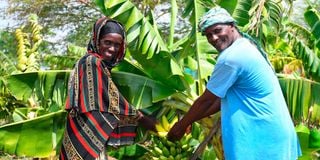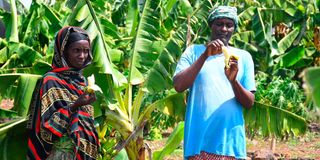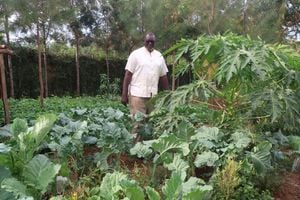
Qabale Bonaya (left) and Guyo Dida at their banana farm in Dololo Dokatu village in Marsabit County on December 10, 2024.
Tuesday midmorning at Dololo Dokatu village in Marsabit. Seeds of Gold meets Qabale Bonaya and Guyo Dida in their banana plantations. The duo cannot hide their excitement about eating the fruits from their banana branches on this almost one-acre farm.
“When we eat bananas from our farms and sell them to the members of our communities we feel so happy. Bananas are very sweet, that is why we take care of our farm produce,” says Ms Bonaya.
For decades, Ms Bonaya relied on charcoal burning to feed her five children. The work was tiresome, and she could only earn Sh800 once a week. Involving herself in banana farming, she says, has helped her community identify the immense farming output.
“Nobody used to do farming here in the past, so we entirely depended on buying food in town after selling charcoal but it was very expensive. We are now into farming because it is a knowledge we have gained since farming is not our culture,” she tells Seeds of Gold.
She is a member of the Dololo Dokatu Farmer Group and is also in charge of the banana project.
The dual purpose, ripening, and cooking variety bananas are planted in the 2 feet by 2 feet square holes. These farmers use manure from livestock that they fill up in the holes whenever they are planting. They say that the abundance of manure has largely contributed to the high production of banana growth and production as the area is fertile for farming.
With no knowledge of crop farming, the over 30 members of this farming group presented a farming proposal to Food for the Hungry, a Christian humanitarian organization dedicated to ending all forms of human poverty.
It is out of the approval of that proposal that the team underwent training at the beginning of 2023. Although a majority of them do not have formal education, the little agricultural knowledge they gained is all they needed to start their new realisations and get into the farms with their jembes.
Later on, Food for the Hungry in Marsabit supported them in planting the bananas as a pilot project after buying 50 seedlings of the three banana varieties from Jomo Kenyatta University of Agriculture and Technology for the group members.
Ms Bonaya says she now relies on agriculture and empowers her community on the importance of smart agriculture. She says that banana farming is not only a source of food for her but also a source of income. According to their book records, they sell a branch of banana at Sh800 in their community to ensure food security in their neighbourhood.
“We got the first fruits in the banana farm after six months. Since then the bananas have grown in numbers and our group has continued to transplant and expand the banana plantation to cover this entire area,” she says.

Qabale Bonaya (left) and Guyo Dida eating banana fruits at their banana farm in Dololo Dokatu village in Marsabit County.
According to Food for the Hungry in Marsabit, after noting that the Dololo Dokatu Farming Group’s banana plantation was thriving, they prequalified the group as a supplier of banana suckers. As a result, the members have supported two other groups within Marsabit County and supplied hundreds of suckers of bananas to those groups at Sh400 per sucker, as evidenced in their record book.
Guyo Dida, also a banana farmer, could not hold back the joy of working on the green leaves that were hiding the ripening banana fruits as he reached his hand to pick one before peeling and eating.
“I used to buy one banana whenever I went to town and eat it there when hungry, now it feels so good that I eat it from our farm,” he told Seeds of Gold.
Mr Dida used to be a pastoralist for the longest part of his life. However, he became a victim of the 2021 drought after all his livestock died, leaving him an idle stressed man. He says that banana agriculture has become an alternative that provides livelihoods to his family and the entire community.
“Banana farming is better than livestock keeping because I work on the farm for hours unlike walking long distances with a herd of livestock in search of pasture. Here we work as a team and save what we sell for our development,” says the father of 13.
As the banana plantation continues to grow and expand, Food for the Hungry in Marsabit says that it has so far conducted value addition and utilization training for the farmers.
Tom Juma, officer implementing the Kenya Resilience, Arid Lands Partnerships for Integrated Development (RAPID +) program in Marsabit, says that from the training the farmers made banana chips for the first time.
“They learned the component of the banana flour which lengthens the shelf life of the bananas. This can make them earn more money because they can package and sell to other communities and towns outside Marsabit while still improving nutrition amongst these households,” says Mr Juma.
With Marsabit being an area prone to drought, these banana farmers recently got a boost through the partnership led by the Millennium Water Alliance. This is according to George Ralak, the Water, Sanitation, and Hygiene technical advisor who is also the project lead for RAPID + in Marsabit for Food for the Hungry.
He says that the project is promoting multiple water uses such as irrigation through its various boreholes in the region.
“We aim to build the resilience of the farmers and the Dololo Dokatu program has put the farmers in a level of confidence and strength. They have water from the boreholes to keep agriculture going, to make them have sales, and from the sales, they can reinvest in the farm,” said Mr Ralak.
The resilience of the Dololo Dokatu banana farmers in this arid and semi-arid land is hoped to operate for the longest time possible. This is pegged on the strong partnership of the members of this community, private sectors, county, and national governments.
“Dololo Dokatu is another heaven where farmers are moving to settle and utilise the boreholes ' water for irrigation. Again, that species of banana is a special type of banana, we thought of giving it a try and after some training, the farmers have immensely surprised us,” Duba Nura, sub-county agriculture officer, Saku in Marsabit, told Seeds of Gold.
The establishment of the Dololo Dokatu model farm is funded by the Swiss Agency for Development and Cooperation. Students in the area do visit it for their research projects.
Alex Mwaura, Food for the Hungry, Country Director in Kenya says that supporting farmers in agriculture as an alternative is a good initiative for the Northern part of the country residents as it helps them to recover from the impacts of the climatic shocks that manifest mainly in the form of severe droughts.
“The challenges in arid lands are complex and there are multiple crises affecting the communities in these areas like access to water. Therefore, it requires partnerships to build household resilience and have exponential results like the thriving banana farming in the Dololo Dokatu area,” Mr Mwaura told Seeds of Gold.









